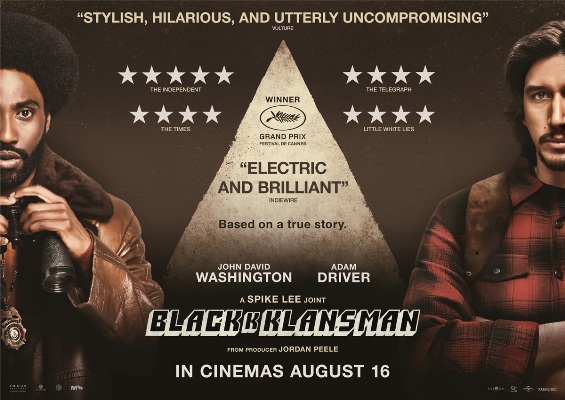"BlacKkKlansman" - Review

When I was in high school, we had one black student in my class. I grew up in Salt Lake City, which wasn’t exactly diverse, and the small private school I went to was even less so. In my sophomore year, we studied Mark Twain’s Huckleberry Finn, and a young girl, through no fault of her own, was essentially forced to speak for the entire black community regarding racial divisiveness in the Civil War South. I’ve been thinking a lot about this, as it seems like more and more individual members of minority groups are being forced to speak for their community as whole. Spike Lee’s BlacKkKlansman explores this racial issue and many more, in a staggering film that is the most important movie of the year.
The year is 1979 and Ron Stallworth (John David Washington) is the first black police detective in Colorado Springs, Colorado. After a brief stint in records, Stallworth is put in an undercover unit where he is tasked with infiltrating a speech by Stokely Carmichael, a former Black Panther (Corey Hawkins). The idea is for him to make sure that Carmichael doesn’t start a riot. The police chief is impressed with Stallworth’s work, and assigns him to intelligence gathering. One day, Ron spots a wanted ad for the local chapter of the Ku Klux Klan. So, he picks up the phone and calls. Ron gets an answer from chapter leader Walter Breachway (Ryan Eggold), and he wants meet up. The problem, obviously, is that Stallworth is black, so he comes up with a plan – Ron will deal with the KKK over the phone while narcotics detective Flip Zimmerman (Adam Driver) will physically infiltrate the Klan. The operation is completely successful, and the pair even meet the leader of the KKK – David Duke (Topher Grace). Did I mention that all of this is based on a true story?
BlacKkKlansman is about a lot of things. It's about how to change systemic racial oppression either from the inside or through violent revolution. It’s about how “passing” as a member of the group in power gains you an amount of privilege, and what should one do with that power. There’s even discussion of blaxploitation films such as Coffy and Shaft, and the representation of black people, as well as representations of white supremacy in films such as Gone with the Wind and The Birth of a Nation. Consider the harrowing sequence where an elder activist, Jerome Taylor (Harry Belafonte), recounts a lynching he witnessed as a youth, intercut with the KKK watching The Birth of a Nation. On top of all this, the film is about the politics of hate. The KKK members we meet in the film are hateful bigots who are most definitely a threat; the real villains, the film says, are people like David Duke whose hate is smart, soft spoken and dressed in a three-piece suit. That is the way hatred is normalized.
All of these themes and ideas could have sent the film spiraling out into an incoherent mess, but Lee keeps everything with a tight focus, which is largely helped by a compelling undercover cop genre piece. The script by Charlie Wachtel, David Rabinowitz, Lee and Kevin Willmot avoids the typical clichés of an undercover cop story, and finds the humor inherent in the story of a black man infiltrating the KKK.
The cast across the board is fantastic. John David Washington’s work here is hilarious and poignant in equal measure, as a good person who wants to change the racist system he’s working in from the inside. Washington’s rapport with Adam Driver is funny and their relationship playing the white and black Ron Stallworth is very funny. Driver gives a very subtle performance that speaks to the themes of racially “passing,” as he’s Jewish. The supporting cast — Ryan Eggold, Jasper Paakkonen and Paul Walter-Hauser, all playing members of the Colorado Springs KKK chapter — are equal parts funny and terrifying. Topher Grace probably has the most difficult part to play. In lesser hands, David Duke could be portrayed as a cartoonish over the top villain, but Grace plays him as a soft-spoken politician, thoroughly convinced that he’s on the right side of history. It’s a terrifying and sad portrayal of a real life monster.
BlacKkKlansman is an uncompromising film from a director working at the peak of his powers, a searing indictment of white complacency surrounding systemic racism. The film may take place in 1979, but considering white supremacists marched in Charlottesville last year, in Portland last week and have a march planned in D.C., BlacKkKlansman couldn’t be timelier. This is a film that presents thought provoking, challenging questions where the answers are even more uncomfortable. It is one of the year’s best films.
Four out of four stars.
 WhoRepresents.com is safe & secure
WhoRepresents.com is safe & secure